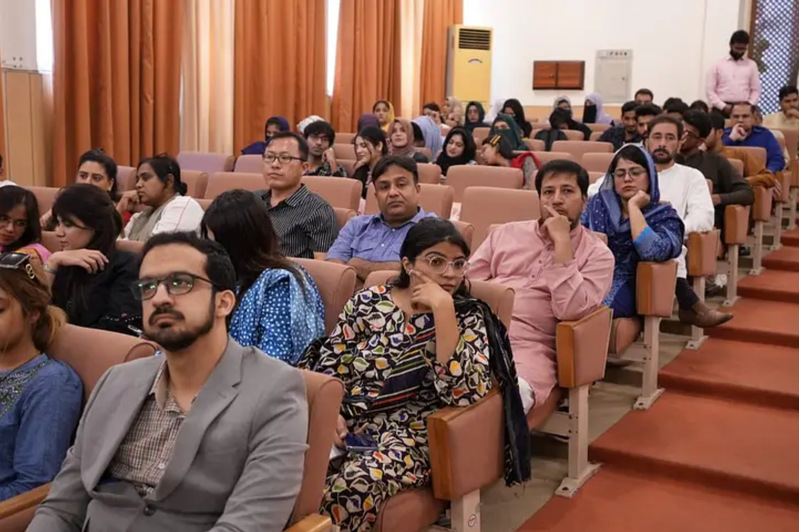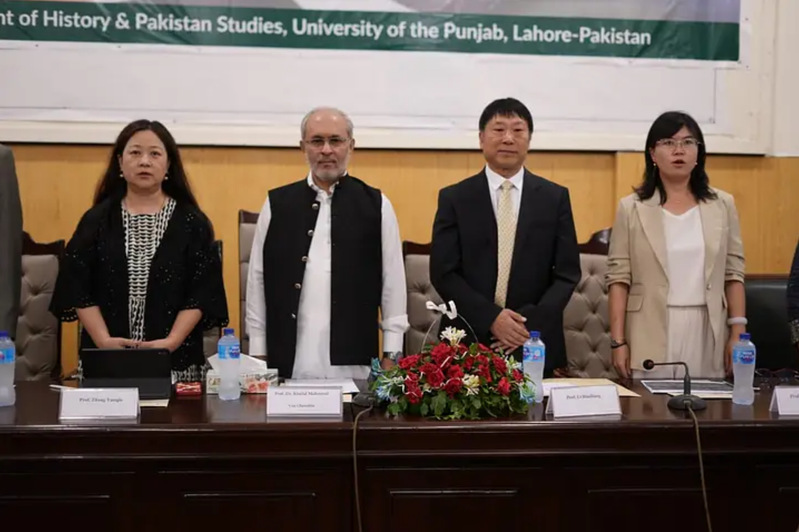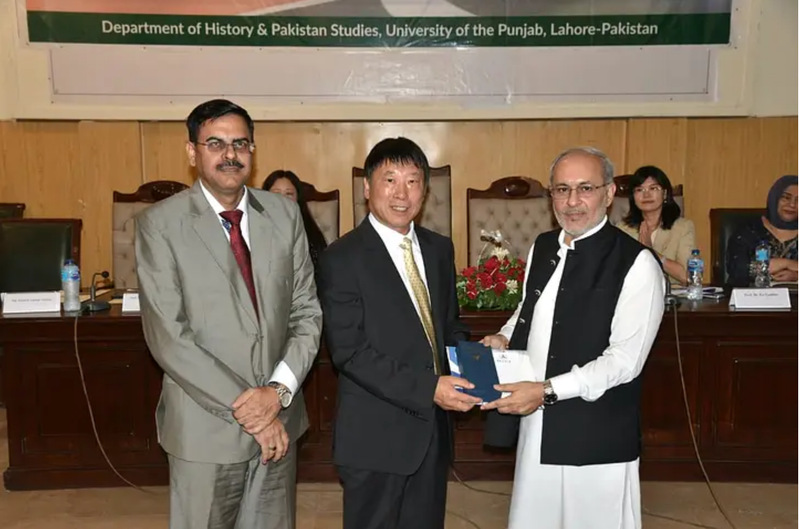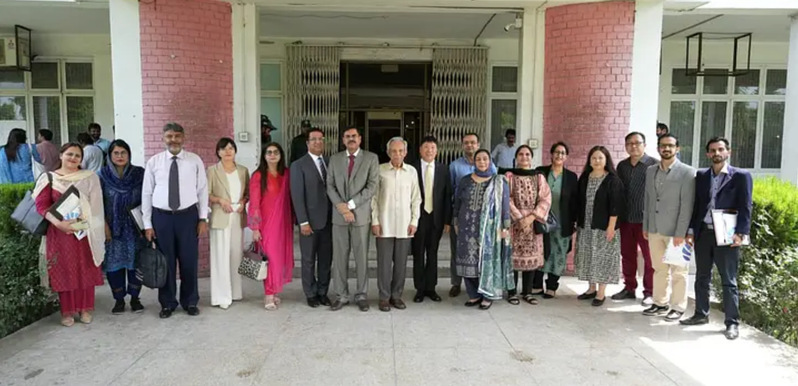On August 28, 2023, a one-day international conference on “Community of Shared Future for Mankind” was held. It was jointly organized by the Department of History and Pakistan Studies, University of the Punjab, Lahore, and the Pakistan Research Centre for a Community with Shared Future (PRCCSF), Islamabad, in collaboration with the Embassy of the People’s Republic of China to Pakistan at Razi Hall, University of the Punjab, Lahore.
The conference was aimed at understanding the most crucial aspects of China’s vision of a shared global community and understand how the concept of Community of Shared Future can be implemented in the future and its usefulness in the CPEC Project. The concept of a community of shared future provides new policies to overcome the challenges faced by the world today. The conference successfully highlighted various aspects of China’s BRI roads to prosperity and the openness and inclusivity of the Community of Shared Future. It created an opportunity for young scholars and researchers to broaden their horizons and deepen their understanding of the concept of a community with a shared future.
The welcome remarks were given by Professor Dr. Mahboob Hussian, Chairman History and Pakistan Studies Department, University of Punjab, Lahore, who welcomed guests from China and other speakers for participating in the conference. He highlighted the role of the Regional Integration Centre in conducting various joint projects, including conferences, training, and exchange learning programs, to achieve shared aspirations.
Professor Dr. Khalid Mahmood, Vice Chancellor, University of the Punjab, Lahore, made welcome remarks and discussed the historic friendship between China and Pakistan. He highlighted the prospects of the conference for sharing ideas and broadening research cooperation among academic institutions in both countries.
Mr. Khalid Taimur Akram, Executive Director, Pakistan Research Centre for a Community with Shared Future (PRCCSF), made opening remarks. He welcomed Chinese scholars and the Vice President of Punjab University. He highlighted the role of PRCCSF for their efforts in fostering academic collaboration and building communities with a shared future.
The worthy visiting guest from China, Professor Li Huailing, Dean of the Institute for a Community with Shared Future, Communication University of China (CUC), Beijing, shared his analysis on D-time and Community with Shared Future. He explained how the concept of Community with a Shared Future adheres to equality and encapsulates an inclusive community of values. It embraces differences, respects all, and advocates for universal prosperity and common development. He concluded by emphasizing the need to establish partnerships of equal treatment, increase mutual consultation, and develop security patterns based on fairness and justice.
Dr. Irum Khalid, Chairperson, Department of Political Science and International Relations, University of the Punjab, Lahore, presented her talk on Community of Shared Future as a Greatest Synergy for Building a Better World. She said China has made productive efforts as a major responsible country to champion the political settlement of crises, resolve international issues, facilitate peace, and de-escalate tensions. She shared some recommendations to anchor world peace and how the world needs to work together. She also discussed challenges and ways to resolve them.
Dr. Fouzia Hadi, Director, Regional Integration Centre, University of the Punjab, Lahore, highlighted the Regional Integration Centre’s commitment to cultivating a shared community concept for regional prosperity. This concept is rooted in the principles of inclusivity, cooperation, and mutual comprehension. A Community of Shared Future emphasizes active listening, respect for diverse viewpoints, and willingness to see the world through others eyes.
Professor Zhang Yanqiu, Deputy Dean of the Institute for a Community with a Shared Future and Director of the Africa Communication Research Centre at CUC, highlighted that democracy is not a special right reserved to an individual country. She explained China’s whole process of people’s democracy and how China has been successful in its ability to enthuse and involve people in the political process. She said that the CPC is different from the ruling political parties in some western systems, where political parties represent only certain groups of voters. She appreciated the role of CPEC leadership in broadening the obligation to enhance the living standard and well-being of all Chinese people.
Professor Dr. Rukhsana Iftikhar, Department of History and Pakistan Studies, University of the Punjab, Lahore, shared her perspective on China’s international relations and CPEC. She highlighted socio-cultural exchange, exchange programs, and P Pakistan’s participation in different Chinese cultural activities between China and Pakistan. She also explained how CPEC has fostered people-to-people contacts, removed language barriers, and diversified academic collaboration between two countries institutes. The exploration of China and Pakistan’s cultural relations in the arts, sciences, and media is growing.




Dr. Rabia Akhtar, Director, Centre for Security, Strategy, and Policy Research (CSSPR), University of Lahore, spoke about Community of Shared Future and the ways forward. She discussed how to engage in constructive dialogue to forge a dynamic shared future. Building a community with a shared future for mankind is rooted in the belief that the world is an interconnected and interdependent community where countries share common interests and responsibilities.
Mr. Ghazi M. Abdullah, Assistant Professor, Department of History and Pakistan Studies, University of the Punjab, Lahore, discussed Ten Years of BRI: A Road to Prosperity. He highlighted how BRI has gone from being an aspiration to a remarkable reality, for providing enormous prioritizing prosperity, culture, and industrial development, including energy, cultural, transportation, and enhancing global peace and development.
Dr. Ge Yangling, Section Chief of the Office of the Institute for a Community with Shared Future, Communication University of China (CUC), China, gave a speech on China’s Women’s All-round Development and Building a Better World for All. She highlighted China’s contribution to women’s empowerment and how women are taking charge of their lives through self-reliance and collaboration, breaking barriers, and generating economic growth. She also highlighted challenges and presented solutions to promote comprehensive development for women, protection of women’s rights, education, and innovation for a bright future.
The closing remarks were made by Professor Dr. Khalid Mahmood, Vice Chancellor of the University of the Punjab, Lahore. He expressed his gratitude to the organizers, speakers, and attendees for contributing to a valuable and insightful conference.
The seminar was attended by the faculty members of the Department of History and Pakistan Studies, the senior management of the Institute for a Community with a Shared Future, print and electronic media reporters, and nearly 100 undergrad and postgraduate students.
Forwared from: https://www.dailybigdigit.com/?p=9902
